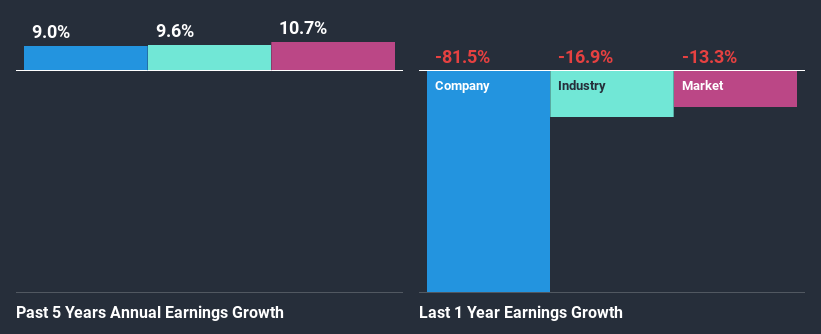Does The Market Have A Low Tolerance For Residential Secure Income plc's (LON:RESI) Mixed Fundamentals?
With its stock down 1.8% over the past three months, it is easy to disregard Residential Secure Income (LON:RESI). It is possible that the markets have ignored the company's differing financials and decided to lean-in to the negative sentiment. Long-term fundamentals are usually what drive market outcomes, so it's worth paying close attention. Specifically, we decided to study Residential Secure Income's ROE in this article.
Return on equity or ROE is a key measure used to assess how efficiently a company's management is utilizing the company's capital. Put another way, it reveals the company's success at turning shareholder investments into profits.
View our latest analysis for Residential Secure Income
How To Calculate Return On Equity?
The formula for ROE is:
Return on Equity = Net Profit (from continuing operations) ÷ Shareholders' Equity
So, based on the above formula, the ROE for Residential Secure Income is:
1.4% = UK£2.4m ÷ UK£180m (Based on the trailing twelve months to September 2020).
The 'return' is the yearly profit. So, this means that for every £1 of its shareholder's investments, the company generates a profit of £0.01.
What Has ROE Got To Do With Earnings Growth?
We have already established that ROE serves as an efficient profit-generating gauge for a company's future earnings. Based on how much of its profits the company chooses to reinvest or "retain", we are then able to evaluate a company's future ability to generate profits. Assuming all else is equal, companies that have both a higher return on equity and higher profit retention are usually the ones that have a higher growth rate when compared to companies that don't have the same features.
A Side By Side comparison of Residential Secure Income's Earnings Growth And 1.4% ROE
As you can see, Residential Secure Income's ROE looks pretty weak. Even compared to the average industry ROE of 5.7%, the company's ROE is quite dismal. Residential Secure Income was still able to see a decent net income growth of 9.0% over the past five years. We believe that there might be other aspects that are positively influencing the company's earnings growth. Such as - high earnings retention or an efficient management in place.
Next, on comparing Residential Secure Income's net income growth with the industry, we found that the company's reported growth is similar to the industry average growth rate of 9.6% in the same period.
The basis for attaching value to a company is, to a great extent, tied to its earnings growth. It’s important for an investor to know whether the market has priced in the company's expected earnings growth (or decline). Doing so will help them establish if the stock's future looks promising or ominous. Is Residential Secure Income fairly valued compared to other companies? These 3 valuation measures might help you decide.
Is Residential Secure Income Efficiently Re-investing Its Profits?
The really high three-year median payout ratio of 117% for Residential Secure Income suggests that the company is paying its shareholders more than what it is earning. In spite of this, the company was able to grow its earnings respectably, as we saw above. Although, the high payout ratio is certainly something we would keep an eye on if the company is not able to keep up its growth, or if business deteriorates. To know the 4 risks we have identified for Residential Secure Income visit our risks dashboard for free.
Besides, Residential Secure Income has been paying dividends over a period of three years. This shows that the company is committed to sharing profits with its shareholders. Upon studying the latest analysts' consensus data, we found that the company is expected to keep paying out approximately 96% of its profits over the next three years. However, Residential Secure Income's ROE is predicted to rise to 3.9% despite there being no anticipated change in its payout ratio.
Summary
Overall, we have mixed feelings about Residential Secure Income. While the company has posted impressive earnings growth, its poor ROE and low earnings retention makes us doubtful if that growth could continue, if by any chance the business is faced with any sort of risk. Having said that, looking at the current analyst estimates, we found that the company's earnings are expected to gain momentum. To know more about the latest analysts predictions for the company, check out this visualization of analyst forecasts for the company.
This article by Simply Wall St is general in nature. It does not constitute a recommendation to buy or sell any stock, and does not take account of your objectives, or your financial situation. We aim to bring you long-term focused analysis driven by fundamental data. Note that our analysis may not factor in the latest price-sensitive company announcements or qualitative material. Simply Wall St has no position in any stocks mentioned.
Have feedback on this article? Concerned about the content? Get in touch with us directly. Alternatively, email editorial-team@simplywallst.com.

 Yahoo Finance
Yahoo Finance 
